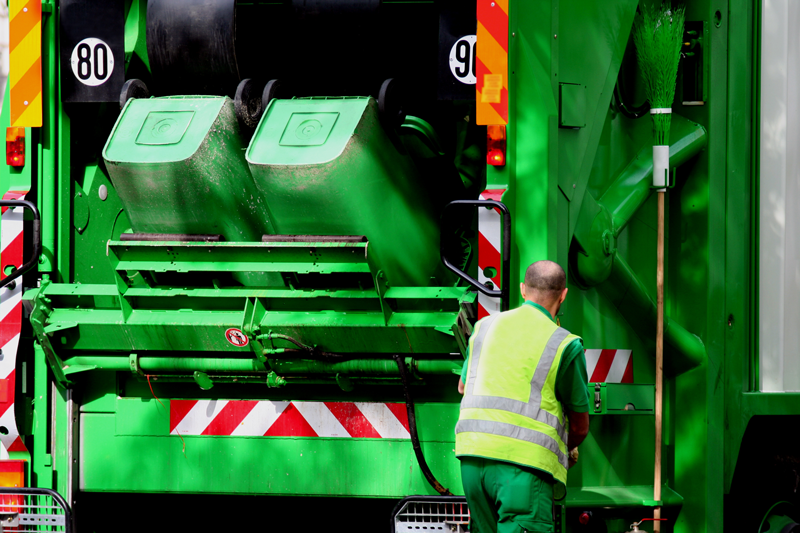
Top 5 Commercial Waste Disposal Companies in the US Compared!
Wondering which commercial waste collection disposal service is best for your business? Well, we’ve got you
Get a quote in seconds with our simple form
What’s something all businesses have in common? They all generate waste. Whether you’re a restaurant tossing food scraps, an office discarding stacks of papers, or dealing with hazardous waste from a construction site, you need a reliable commercial waste disposal service.
It may not be the most glamorous topic, but understanding how to properly handle and dispose of your waste is a crucial part of running a business. If you don’t do this right, it can lead to serious financial and reputational consequences.
But don’t worry about that – it’s not going to happen to you. Why? Because you’re about to learn everything you need to know about commercial waste disposal.
Commercial waste, also known as business or trade waste, refers to any waste generated by business activities. This can range from construction debris to confidential documents, from glass bottles to old electronics.
Loads of businesses in the US prefer to use a professional commercial waste disposal service, rather than dealing with their waste themselves. This helps save you time, energy, and the hassle of obtaining the proper certifications, as well as ensuring the waste is correctly handled, transported, and disposed of.
Let’s be honest – do you really want to make multiple trips to the dumpster when you already have a million other things to deal with?
Business owners need to understand the rules when it comes to commercial waste disposal. These laws are necessary to prevent harm to people’s health and safety, and there are severe financial penalties for those who fail to dispose of waste properly.
They say “no press is bad press,” but that’s not the case if you’re in the local news for violating waste disposal laws. Think about it: would you eat at a restaurant that’s breaking the law?
A reputational hit like this is tough to recover from. No matter how far you’ve come, to some people, you’ll always be the business that got fined for violating waste disposal laws.
It’s important to keep your business eco-friendly when managing your waste. Improper disposal can cause significant harm to the local environment and wildlife.
If you work in manufacturing or construction, you’re likely using hazardous chemicals and materials. If these aren’t disposed of properly, they can leak into water sources and soil, impacting both human and animal populations.
Healthcare facilities and tattoo parlors also need to correctly dispose of biological waste and used needles. If these aren’t handled properly, they pose a significant biohazard risk, potentially contaminating people with diseases.
Complying with all the different federal, state, and local laws and regulations surrounding hazardous waste disposal is therefore vitally important.
Businesses generate a variety of waste, depending on the industry. A construction site, for example, will produce vastly different types of waste than an office. Below, we’ve broken down the various types of commercial waste and which industries are likely to produce them.
General waste is typically found in offices and consists of non-recyclable, non-hazardous materials like paper, packaging, and single-use plastic items.
This includes food scraps, grass clippings, spoiled produce, and other green waste.
E-waste consists of old electronic devices like computers, mobile phones, printers, and cables.
This is waste that presents a risk to human or environmental health. It includes things like solvents, chemicals, batteries, and certain medical waste. These items must be disposed of according to hazardous waste regulations, which are enforced by the EPA.
This waste is generated during construction projects and building renovations. It typically includes materials like wood, concrete, and metal.
Like paper and cardboard, plastic and packaging waste are common types of waste found across many industries.
This waste category is related to medical or human procedures, commonly found in the healthcare, cosmetics, and tattoo industries.
Textile waste includes fabrics, old clothing, and scraps from clothing manufacturers.
Confidential waste is any waste containing sensitive information about your business or customers. You are legally obligated to protect this data, and mishandling it can lead to serious legal issues.
Unlike household waste, commercial waste has to be disposed of via the correct channels. If you fail to adhere to these regulations, you could breach a number of federally regulated laws. Below are just a few you need to be aware of.
The RCRA, enforced by the Environmental Protection Agency (EPA), requires all businesses to manage solid and hazardous waste through their entire lifecycle. This means from creation to disposal and identifying, labeling, storing, transporting with certified handlers, and documenting all waste properly.
CERCLA, or Superfund law, makes companies liable for the costly cleanup of hazardous waste at contaminated sites if they dispose of it improperly.
The CWA and CAA regulate discharges into water and emissions into the air. They mandate that businesses require permits and enforce strict compliance to limit pollution from waste disposal as a result of commercial operations.
Depending on what state you operate in, you may also be subject to specific state-regulated laws. Always check with your local authorities to make sure you don’t accidentally break compliance and end up on the wrong end of expensive fines and legal troubles.
The cost of commercial waste collection will depend on four main factors:
For example, it will generally be cheaper to have a provider collect papers from your office every month in a city location, rather than having hazardous waste picked up weekly from a remote area.
Now, you’re probably asking, “How much does waste collection cost?” Not all commercial waste removal companies are created equal. Each will come with its stipulations, while your specific needs will also come into play. The four main points of consideration are:
Although it will vary from provider to provider, you may be able to choose between two types of collections.
These are regular, scheduled waste pickups—daily, weekly, or monthly. They’re tailored to your specific needs and are often cheaper than one-off collections (based on price per collection). This is due to their predictability, and some providers may even offer discounted rates for longer-term contracts, translating into even more savings.
These are ad-hoc services arranged as needed. Although they’re flexible, you’ll pay more per pickup. The lack of a schedule will result in higher operational costs, which the providers must pass on to you.
Recurring collections can provide cost savings through efficiency and potential discounts for long-term contracts. One-off collections offer more flexibility but at the trade-off of a higher price per collection.
But which is better? Well, that’s up to you and your specific business. Before deciding, assess your needs, budget, levels, and frequency of waste generation.
Choosing the Right Provider
There are many different providers out there. Some may be better suited to your needs than others. Here are a few things to consider when finding the best one for you.
Types of Disposals They Offer
Not all companies can handle, transport, and dispose of certain types of waste. Hazardous materials, for example, require special permits. If they don’t have them, you’ll need to look elsewhere if you require these services.
Legal Compliance
Speaking of licensing, even if you don’t need hazardous materials removed, make sure your supplier is legally qualified to remove waste from your premises.
Do They Operate in Your Area?
You may find a provider that looks amazing on paper, but it’s irrelevant if they can’t get to and from your premises. To be able to collect your waste, the company concerned needs to have the relevant permissions from your local authority. This could include the requirement for several types of licenses, and you need to make sure that your waste handler has these in place.
Reputation and Customer Service
Always check the reviews before signing anything. If you get one or two that say they’re terrible, probably take these with a pinch of salt. But if you see multiple people mention the same problem, stay well away from them.
Cost
It may seem obvious, but always make sure you can afford the service. If you sign up for a long-term contract you can’t afford, it may be difficult to leave before it expires.
It’s almost certain that your business could benefit from a professional commercial waste disposal service, and we can help!
All you have to do is tap the button on this page, answer a few quick questions about your business, and receive a quote tailored to your specific needs.
All quotes are noncommittal and 100% free, so get yours now!
This will depend on four main factors:
It will be cheaper to have the service collect papers from your city office once a month rather than have hazardous waste collected from a remote location weekly.
This depends on your provider.
Most waste management companies require you to sign up for recurring services, similar to a gym membership or cell phone plan. However, some providers may offer one-time collections.
We’ve compiled a guide to some of the top US commercial waste companies that may suit your needs.

Wondering which commercial waste collection disposal service is best for your business? Well, we’ve got you



CommercialExperts.com helps savvy US businesses to save time and money by comparing a wide range of essential products and services.
© CommercialExperts.com 2026 All rights reserved. TFLI (US) Inc d/b/a CommercialExperts.com . Registered in the US, number P20000059850. Registered Office Address: 1200 Brickell Avenue, Suite 1950 #1016, Miami, Florida, 33131.